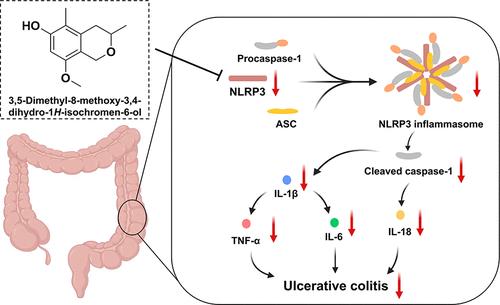当前位置:
X-MOL 学术
›
J. Agric. Food Chem.
›
论文详情
Our official English website, www.x-mol.net, welcomes your
feedback! (Note: you will need to create a separate account there.)
3,5-Dimethyl-8-methoxy-3,4-dihydro-1H-isochromen-6-ol Attenuates Ulcerative Colitis via Targeting NLRP3 in Mice
Journal of Agricultural and Food Chemistry ( IF 5.7 ) Pub Date : 2024-07-22 , DOI: 10.1021/acs.jafc.4c00971 Mengru Zhou 1 , Xiaoyao Ma 2 , Jiaqi Zhang 1 , Xuan Lu 2
Journal of Agricultural and Food Chemistry ( IF 5.7 ) Pub Date : 2024-07-22 , DOI: 10.1021/acs.jafc.4c00971 Mengru Zhou 1 , Xiaoyao Ma 2 , Jiaqi Zhang 1 , Xuan Lu 2
Affiliation

|
3,5-Dimethyl-8-methoxy-3,4-dihydro-1H-isochromen-6-ol (DMD) is a polyketide compound obtained from the endophytic fungus Penicillium sp. HJT-A-10 of Rhodiola tibetica. R. tibetica is a nourishing food and also used in traditional Chinese medicine and Xizang medicine. In dextran sulfate sodium (DSS)-induced ulcerative colitis (UC) mice, DMD significantly alleviated the pathological symptom of UC. Network pharmacology studies have shown that nucleotide-binding domain-like receptor family pyrin domain containing (NLRP) 3 is the primary target protein of DMD associated with anti-UC. In molecular biology studies, DMD suppressed the activation of NLRP3 and decreased the expression of downstream inflammatory proteins and pro-inflammatory cytokines in UC. The finding was further verified in knockout mice. DMD lost the effect of attenuating DSS-induced UC in NLRP3–/– mice. In conclusion, this study demonstrates that DMD reduces inflammatory response and balances the barrier integrity to attenuate UC via targeting NLRP3, and DMD is a potential natural agent or dietary supplement for attenuating UC.
更新日期:2024-07-22






























 京公网安备 11010802027423号
京公网安备 11010802027423号